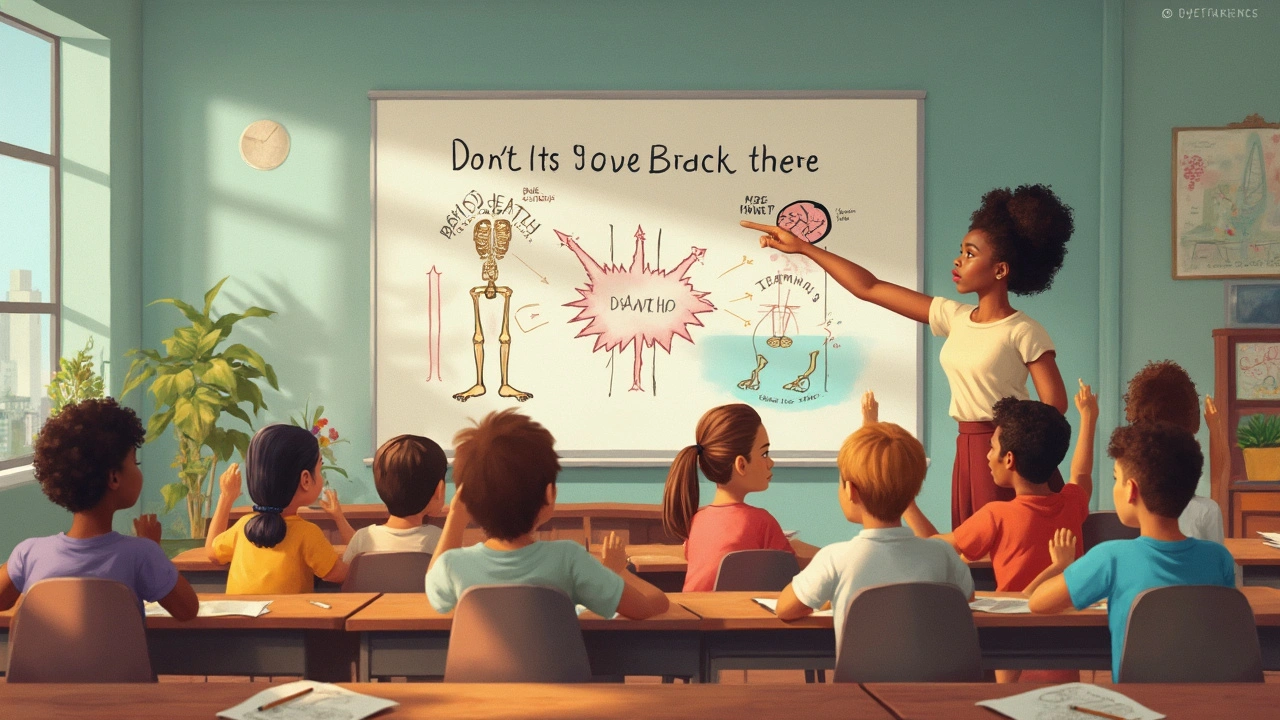Imagine a world where brittle bones might also signal a brain that's wired differently. It sounds like a stretch—bones and brains, what could be the link? But doctors and researchers keep spotting something odd: young kids with rickets, a bone-weakening disease mostly caused by too little vitamin D, seem to turn up more often with autism spectrum disorder (ASD) flags. Puzzled parents and careful doctors started asking: Are these two conditions just bumping into each other by chance, or is there a real connection here? With cases of rickets making a comeback in some countries, while autism diagnoses keep rising, it’s a question that feels more urgent than ever. Some call it a coincidence, others say it’s just the tip of the iceberg. Either way, understanding where bone health and neurodevelopment meet could change the game for a lot of kids.
The Science Behind Rickets and Autism Spectrum Disorder
So, here’s what we know. Rickets happens when the body doesn’t get enough vitamin D, calcium, or phosphate. For most kids, vitamin D is the real troublemaker—it helps absorb calcium to keep bones strong. Without it, you get soft, bent, or even fractured bones. Rickets isn’t ancient history; while it used to be a big deal in the Victorian era, certain communities still see it flare up. Think of families living in places where there’s not much sunlight, kids with diets low in dairy, or those who cover up for cultural or health reasons.
Autism spectrum disorder, on the other hand, isn’t about bones at all. It’s about the way the brain develops and processes the world. Kids with ASD might struggle to talk or interact, have strong interests, or act in ways other kids don’t. It’s not something ‘caught’ or caused by bad parenting—it’s just how some brains are set up. But what’s stirring debate is: could the shortage of vitamin D, which can lead to rickets, also play a part in how the brain develops?
Scientists are taking this link seriously. For starters, vitamin D does way more than help bones. It’s found in the brain and influences how nerves talk to each other. Back in 2016, an Australian group zeroed in on a trend—moms with low vitamin D had a higher chance of having a child with ASD. It wasn’t a tiny difference—kids whose moms were very low on vitamin D during pregnancy were almost twice as likely to show ASD features than those whose moms had healthy levels. The study shook up a lot of old thinking about autism causes.
Why might vitamin D matter for the brain? Well, vitamin D helps regulate genes that build the nervous system. It’s also a player in immune function. Some researchers argue that low vitamin D might mess with early brain wiring or turn up the risk of inflammation that leads to ASD. Others push back—saying, hold on, autism is complex and has genetic roots, so we can’t pin it on one thing.
Still, numbers keep popping up. A 2021 study from China looked at over 200 kids and found that children with both ASD and rickets had lower vitamin D levels compared to kids with just ASD or no diagnosis. Maybe it’s coincidence, but the fact that this keeps showing up on different continents—Australia, China, even in Scandinavian data—has people asking if we should rethink vitamin D’s role.
Here’s a quick look at what recent studies have found:
| Study/Year | Population | Main finding |
|---|---|---|
| Australian (2016) | 4,200 mothers | Low maternal vitamin D doubled ASD risk |
| China (2021) | 220 children | Kids with rickets and ASD had lowest vitamin D |
| US CDC (2023) | 38,000 children | Rickets more common in ASD kids than typical peers |
Plenty of scientists say: We need more proof. Still, the pattern is hard to ignore, especially if you’re a parent wondering if a simple vitamin could make a difference. It’s not about offering a cure—more about understanding risk and ways to lower it.

How Rickets and Autism Might Interact
If you’ve ever parented a picky eater or struggled to get your child outside, you’ll know this—getting enough vitamin D can be a battle, especially in northern places or in families with special diets. Now toss in ASD, where sensory issues already make eating certain foods and playing outside harder. Kids on the autism spectrum often have strong food aversions, and many don’t like the sun or are sensitive to its glare. That can push their risk for rickets even higher without any parent realizing it.
But does rickets cause autism? Not quite. Researchers say it’s rarely that simple. While low vitamin D might nudge the risk up, autism is still shaped by dozens of genes, pregnancy factors, and early health influences. Still, young brains grow fast, and vitamin D shows up in parts of the brain tied to emotions, memory, and language. If a pregnant woman or a young child doesn’t get enough, some brain connections might not develop as robustly.
So, think of it this way—vitamin D doesn’t directly cause (or prevent) autism, but it might set the stage, especially when combined with other risk factors.
Doctors also flag that rickets can slow motor development, causing low muscle tone or delayed walking—which can look similar to some early autism signs. That can make it tricky for families and doctors to know what’s what. Is a child not walking because of wobbly bones, or is it part of a bigger developmental pattern?
Adding to the puzzle, both rickets and ASD seem more common in kids with dark skin, simply because darker skin makes less vitamin D from the same amount of sun. So, some groups see higher risk for both, but it’s not about blame—just biology. In the UK between 2019 and 2022, Somali and Pakistani families made up a much higher fraction of rickets and ASD cases compared to white British families, even after accounting for other health and income factors.
When it comes to daily life, these overlaps matter. A child with rickets may be irritable, tired, or slow to grow—not so different from the struggles many autistic kids face already. Doctors are starting to screen for both conditions if a child turns up with developmental delays and poor growth.
- If your child is on the autism spectrum, ask about testing vitamin D, especially if you live up north or eat a dairy-free/vegan diet.
- If your child already has rickets, keep an eye out for social or communication delays, and share any worries with your pediatrician fast.
Some tips sound almost too simple: get outside for some sunlight (even 20 minutes can make a difference), look for vitamin D-fortified foods, and ask your doctor about safe supplements, especially in winter months. Using tech tools like reminder apps to track sun time or vitamins helps parents who juggle lots of daily routines, especially in families with special needs kids.
The key is not to obsess over one vitamin, but to pay attention to patterns. Kids on the spectrum often have a host of challenges with food, digestion, and energy. Sometimes these are blamed on 'just autism,' when in fact there’s a treatable issue like low vitamin D hiding in plain sight.
Don’t forget about regional quirks, either. If you live somewhere where it’s dark half the year—hello, Scandinavia or Alaska—you might need extra boosts. Vitamin D blood testing is quick and not expensive. It’s worth checking, along with regular growth measurements for bones and weight. Schools and pediatricians are getting better about asking the right questions, so keep them in the loop and share any family history.

Taking Action: What Parents and Care Teams Can Do
You don’t need a medical degree to help your child steer clear of both rickets and vitamin D deficiency, especially if they’re on the autism spectrum. Start with food. Fatty fish like salmon, dairy if tolerated, eggs, and fortified cereals all pack a vitamin D punch. For picky eaters or kids with allergies, there are flavorless supplements and even gummy versions most kids tolerate. Always talk to a doctor before starting anything new, but don’t be shy about bringing up concerns.
- Most pediatricians recommend at least 400–600 IU of vitamin D per day for young children. In kids at risk (dark skin, little sun, special diets), some experts suggest more, but only with doctor supervision.
- Sunlight remains the gold standard—15–30 minutes a day can be enough even on cloudy days, as long as arms and face are uncovered.
- For infants who are breastfed and don't take a formula, a daily drop of vitamin D is standard advice until they transition to solids or fortified formula.
- For autistic kids with sensory needs, find gentle ways to get outdoors—nature walks, backyard play, or even sitting by a sunny window can help if they really avoid direct sunlight.
School nurses and teachers can play a role too. If a child seems tired, slow to heal from fractures, or falls behind in gym, ask about bone health. Many schools now ask about diet and outdoor time on health forms for precisely this reason.
One thing specialists urge: don’t get lost in myths or extreme diets you find online. You’d be surprised how many ‘miracle cures’ pop up, but there’s no proof that flooding a child with vitamin D reverses autism. The goal isn’t to ‘fix’ a child, but to give their body—and mind—the building blocks for healthy growth.
Insurance companies in 2025 are getting savvier about covering vitamin D testing for high-risk children, especially if there’s a family history of rickets, seizures, or auto-immune problems. Save your receipts and ask about coverage.
If you’re worried, connect with other parents (online or locally). Sometimes one parent’s story about a hidden rickets diagnosis will spark hundreds of others to check. There’s power in sharing info—and in pushing your care team to look beyond the usual checklists. Remember, this is about one piece of a much bigger puzzle. Autism remains a spectrum for a reason—each child is unique, and vitamin D is just one block in a complex story.
Bottom line: rickets and autism spectrum disorder can overlap, but one doesn’t have to mean the other. Keeping bones strong and vitamin D levels healthy won’t prevent every challenge, but it could make a real difference—both in body and brain. If you’ve got questions, bring them to your pediatrician, and don’t brush off a hunch. Sometimes, the simplest changes help the most.



Wow, this article really opened my eyes about the connection between rickets and autism spectrum disorder. I had no idea that vitamin D plays such a crucial role not just in bone health but potentially in brain development too. It's fascinating how something seemingly unrelated like bone health can have impacts on neurological conditions.
I think the practical advice for families is super important because knowledge like this can empower parents and educators to be more proactive. I wonder if more pediatricians will start screening for vitamin D deficiency routinely because of these findings.
Has anyone here seen changes in their child's wellbeing after addressing vitamin D levels? I'd be curious to hear real-life experiences.